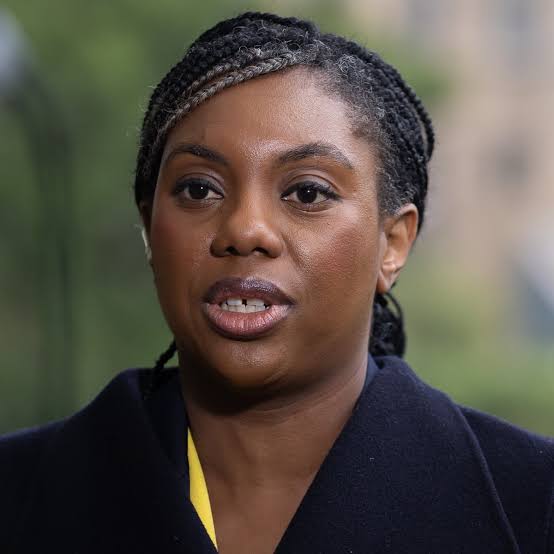
Raphael Kanu
Leader of the United Kingdom’s Conservative Party, Kemi Badenoch, has revealed she is facing an unprecedented wave of racist abuse after becoming the first Black woman to lead the Party.
In an interview with the Sunday Times, Badenoch described the attacks as “hysterical” and said the scale of vitriol, particularly on social media, had taken her by surprise. She explained that while she occasionally encounters resistance within her Party, the more vicious attacks come from outside political circles, especially from anonymous voices on online platforms who target her because of her race and ethnicity. According to her, only two or three MPs out of 120 have shown open hostility, but the more relentless attacks portray her historic achievement as improbable, attributing it to forces outside her own ability.
“There’s a certain cadre of people who clearly can’t cope with the fact that I won this and I’m doing it. The level of personal attacks from anonymous people, it’s hysterical,” she said. “People used to talk about Trump derangement syndrome. I think there’s a Kemi derangement syndrome: ‘How could she possibly have done this?’”
Badenoch explained that much of the abuse contains ethno-nationalist undertones, with critics insisting she could not have risen to her current position independently. “There’s a lot of ethno-nationalism creeping up, lots of stuff about my race and my ethnicity and the tropes around, ‘well, she couldn’t possibly have done this all by herself’,” she said.
Badenoch, who was born in Wimbledon but spent much of her early life in Nigeria before returning to the UK at the age of 16, has previously sparked debate with her outspoken views on race and identity. She once stated that she is not really Nigerian by national identity, choosing instead to identify with her Yoruba tribal heritage.
She has long argued against portraying the UK as a systematically racist society. In 2020, she drew sharp criticism when she declared that Britain was not a racist country and insisted ethnic minorities perform relatively well compared to disadvantaged white working-class boys.
Reflecting on that controversy, she said, “I always try to think of every possible explanation before I go to race and racism. I think that is a healthy way to run a society. I remember when I stood up a few years ago and said Britain is not a racist country – ethnic minorities do very well here, it is white working-class boys who are actually struggling on a lot of metrics, and I got pilloried for that. My view is that there are people out there who will say whatever it is, they will throw whatever kind of mud at you and they will hope that it sticks.”
As Badenoch settles into her new role as Conservative leader, speculation has grown around internal divisions and the possibility of a leadership challenge. Reports suggested that Robert Jenrick, the shadow justice secretary, could emerge as a potential rival. But Badenoch dismissed such claims as “wishful thinking.” “There will always be people who are sore losers — our candidate didn’t win, and so on, and sour grapes. When I hear those things, I can tell those people are not focused on the country at all. Many of those people having those conversations think this is a game. But the lives of people in this country aren’t a game,” she said.
Badenoch’s leadership marks a pivotal moment for the Conservative Party as it seeks to rebuild following electoral setbacks. Her identity as a Black, female, and immigrant-rooted leader has generated both admiration and hostility, placing her at the centre of debates on race, belonging, and political legitimacy in modern Britain. For now, she insists she will remain focused on her responsibility to deliver results for the British people, despite what she describes as a “hysterical” campaign of racist attacks.
